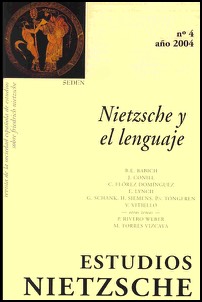Procesos semánticos en los textos filosóficos de Nietzsche y su función filosófica: Algunos resultados de la investigación sobre el «Diccionario-Nietzsche»
DOI:
https://doi.org/10.24310/EstudiosNIETen.vi4.9142Abstract
Este artículo presenta algunos resultados del proyecto del diccionario de Nietzsche. Este proyecto consta de un grupo de investigación internacional y tiene su sede en la Universidad de Nijmegen, en Holanda (ver Estudios Nietzsche 3, 2003, 207-214). El volumen I del diccionario aparecerá en breve. El uso de Nietzsche del lenguaje pone de manifiesto una serie de rasgos que son característicos para su proyecto filosófico. Esos incluyen procesos semánticos específicos o procedimientos para la constitución y transformación del significado, desde el uso de diferentes ópticas, la transgresión de significados polarizados, a la transvaloración de términos y valores tradicionales. Un número de estos procesos son descritos en este artículo con la ayuda de ejemplos tomados del diccionario.
Downloads
Metrics
References
C. Aydin, Zijn en Worden. Nietzsches Omduiding van het Substantiebegrip, Diss. Nijmegen, 2003
T. Böning, Metaphysik, Kunst und Sprache beim frühen Nietzsche, De Gruyter, Berlin, 1988.
V. Gerhardt, ‘Wille zur Mach’, en H. Toman (ed.), Nietzsche Handbuch, Metzler, Stuttgart,
, pp. 353-354.
G. T. Martin, From Nietzsche to Wittgenstein, P. Lang. Bern, Frankfurt a.M., 1989
A. Mette, Zur Psychologie des Dionysischen. In: Imago. Zeitschrift für Anwendung der Psychoanalyse auf die Geisteswissenschaften. Hg. Sigmund Freud. Leipzig, Wien u. Zürich. Nr. 20, 1934, 191-218.
W. Müller-Lauter, Nietzsche. Seine Philosophie der Gegensätze und die Gegensätze seiner Philosophie. Walter de Gruyter, Berlin, 1971
B. von Reibnitz, Ein Kommentar zu Friedrich Nietzsche, «Die Geburt der Tragödie aus dem Geiste der Musik» (Kap. 1-12), Metzler, Stuttgart, 1992
G. Schank, Dionysos gegen den Gekreuzigten, P. Lang, Bern, 1993.
W. Ulrich, Wörterbuch Linguistische Grundbegriffe, Ferdinand Hirt., Kiel, 1972
H. Widhammer, Realismus und klassizistische Tradition. Zur Theorie der Literatur in Deutschland 1848-1860, Diss. Tübingen, 1972
Downloads
Published
How to Cite
Issue
Section
License
As of issue 21 (2021) this journal is published only in open access (diamond route).
From that number 21, like the previous numbers published in NIETZSCHE STUDIES, they are subject to the Creative Commons Acknowledgment-NoComercia-ShareIgual 4.0 license, the full text of which can be consulted at <http://creativecommons.org/licenses/by-nc-sa/4.0 >
It is the responsibility of the authors to obtain the necessary permissions of the images that are subject to copyright.
This work is licensed under a Creative Commons Attribution-NonCommercial-ShareAlike 4.0 International License.
Copyright generates two different rights: moral rights and patrimonial rights that EJFB recognizes and respects. Moral rights are those relating to the recognition of the authorship. They are rights of a personal nature that are perpetual, inalienable, unseizable and imprescriptible as consequence of the indivisible union of the author and his/her work.
Patrimonial rights are those that can be derived from the reproduction, distribution, adaptation or communication of the work, among others.







11.png)
